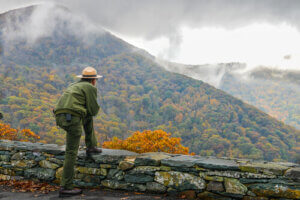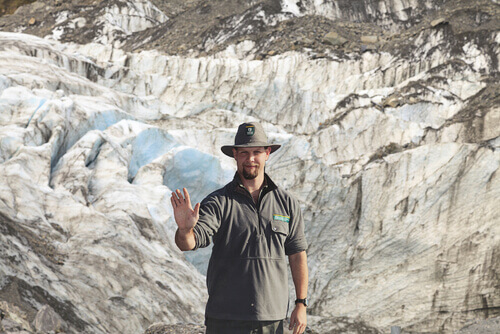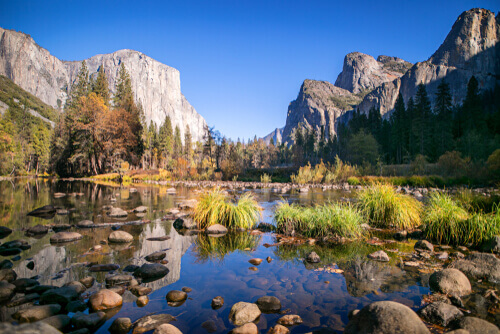All About How to Become a Park Ranger

A park ranger has many responsibilities within a specific area of nature. In addition to caring for the flora and fauna, their goal is to teach visitors about the place, prevent fires, and investigate biodiversity. If you want to know how to become a park ranger, then read on.
Becoming a park ranger: Is it really for me?
According to the definition, a park ranger is a person who’s in charge of the protection and preservation of all aspects in wild, historical, or cultural areas. They also provide interpretation and recreation activities for all ages and are a link between local communities and visitors.
Before taking the decision to become a ranger, you should consider what your obligations and tasks would be. Some dedicate their work to science and research. So, they collect samples of plants, bones, fecal matter, or any other element that allows them to analyze one or several species in the area.
Others focus on education, meaning they welcome visitors and tell them about the ecosystem, geological formations, geography, and ecology.
We can also find law-enforcement rangers, who work to prevent forest fires or, in the case of remote areas, for example, to combat poaching.

During the carrying out of their duties, they may move about by boat, on horseback, in four-wheel-drive vehicles and, of course, on foot.
Being a park ranger requires sacrifice
However, not everything is ‘action’ in the life of a park ranger. Rather, they must also take care of administrative tasks, the sale of tickets or items that are useful for visitors, or even clean the common areas.
At the same time, when a person becomes a park ranger, they must be ready to work in unfavorable conditions. In other words, cold, heat, snow, rain, etc. It can be a very arduous task, but at the same time, rewarding.
Not everyone knows about the work that caring for a national park or nature reserve involves. In order for these sites to maintain their ‘paradise’ status and for us to enjoy them, someone must take care of the maintenance.
A ranger dedicates their body and soul to the protection of the area. They don’t mind sleepless nights when it comes to putting out a fire or watching the behavior of an endangered animal.

Tips for becoming a park ranger
The personality of a park ranger is based on love and respect for nature, on being a charismatic leader, and not considering their work to be a chore or a burden. After all, they must be at their post during vacation times, holidays, and weekends. So, if you want to become a park ranger, here are some recommendations:
1. Be familiar with your country’s parks
The national park system is similar throughout the world, although the legislation changes according to each country or state/province. It’s very important to be aware of the laws and rules surrounding this task.
2. Go to school (and graduate)
Simply being a ‘nature lover’ isn’t enough to become a park ranger. You also need to be qualified for this complex and valuable task. There are a number of different majors that will prepare you for the tasks that being a park ranger involves.
For example, criminal justice, wildlife and forestry conservation, parks and recreation management, etc. Additionally, you’ll need training from the National Park Service.
3. Search for contacts in the desired park
It’s not always easy to get a park ranger job in the area or park that you want. For example, you may prefer to work in the forest or the mountains, but you’ve only been able to find work in coastal or jungle areas.
At first, you may have to accept jobs in more remote areas, or ones that wouldn’t be your first choice. And you may even have to take on tasks and activities that you find monotonous. However, all this serves to give you experience, so that you can apply for more interesting positions in the future.
If, for example, you have a park near your home and you’d like to work there, then the best thing you can do is to contact the people who run the place. Once they’ve got to know you, and know that you’ve studied to be a park ranger, then you may have a better chance of getting the position.
A park ranger has many responsibilities within a specific area of nature. In addition to caring for the flora and fauna, their goal is to teach visitors about the place, prevent fires, and investigate biodiversity. If you want to know how to become a park ranger, then read on.
Becoming a park ranger: Is it really for me?
According to the definition, a park ranger is a person who’s in charge of the protection and preservation of all aspects in wild, historical, or cultural areas. They also provide interpretation and recreation activities for all ages and are a link between local communities and visitors.
Before taking the decision to become a ranger, you should consider what your obligations and tasks would be. Some dedicate their work to science and research. So, they collect samples of plants, bones, fecal matter, or any other element that allows them to analyze one or several species in the area.
Others focus on education, meaning they welcome visitors and tell them about the ecosystem, geological formations, geography, and ecology.
We can also find law-enforcement rangers, who work to prevent forest fires or, in the case of remote areas, for example, to combat poaching.

During the carrying out of their duties, they may move about by boat, on horseback, in four-wheel-drive vehicles and, of course, on foot.
Being a park ranger requires sacrifice
However, not everything is ‘action’ in the life of a park ranger. Rather, they must also take care of administrative tasks, the sale of tickets or items that are useful for visitors, or even clean the common areas.
At the same time, when a person becomes a park ranger, they must be ready to work in unfavorable conditions. In other words, cold, heat, snow, rain, etc. It can be a very arduous task, but at the same time, rewarding.
Not everyone knows about the work that caring for a national park or nature reserve involves. In order for these sites to maintain their ‘paradise’ status and for us to enjoy them, someone must take care of the maintenance.
A ranger dedicates their body and soul to the protection of the area. They don’t mind sleepless nights when it comes to putting out a fire or watching the behavior of an endangered animal.

Tips for becoming a park ranger
The personality of a park ranger is based on love and respect for nature, on being a charismatic leader, and not considering their work to be a chore or a burden. After all, they must be at their post during vacation times, holidays, and weekends. So, if you want to become a park ranger, here are some recommendations:
1. Be familiar with your country’s parks
The national park system is similar throughout the world, although the legislation changes according to each country or state/province. It’s very important to be aware of the laws and rules surrounding this task.
2. Go to school (and graduate)
Simply being a ‘nature lover’ isn’t enough to become a park ranger. You also need to be qualified for this complex and valuable task. There are a number of different majors that will prepare you for the tasks that being a park ranger involves.
For example, criminal justice, wildlife and forestry conservation, parks and recreation management, etc. Additionally, you’ll need training from the National Park Service.
3. Search for contacts in the desired park
It’s not always easy to get a park ranger job in the area or park that you want. For example, you may prefer to work in the forest or the mountains, but you’ve only been able to find work in coastal or jungle areas.
At first, you may have to accept jobs in more remote areas, or ones that wouldn’t be your first choice. And you may even have to take on tasks and activities that you find monotonous. However, all this serves to give you experience, so that you can apply for more interesting positions in the future.
If, for example, you have a park near your home and you’d like to work there, then the best thing you can do is to contact the people who run the place. Once they’ve got to know you, and know that you’ve studied to be a park ranger, then you may have a better chance of getting the position.
This text is provided for informational purposes only and does not replace consultation with a professional. If in doubt, consult your specialist.








